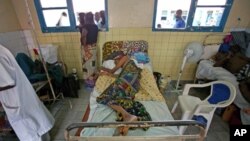The medical aid agency Doctors Without Borders is calling on international donors and the government of the Democratic Republic of Congo to beef up funding and other resources for HIV/AIDS testing and treatment. The group estimates that some 85 percent of AIDS patients are not getting the treatment they need in that country. A statement from the group warns that up to 15,000 AIDS victims in DRC could die in the next three years because of difficulty getting life-saving drugs.
Dr. Laura Rinchey, who specializes in the treatment of HIV/AIDS, said 90 percent of her patients are virtually at death’s door when they come to her.
“They often have malnutrition, as well as tuberculosis, as well as toxoplasmosis, as well as other bacterial infections or other complications such as meningitis. We are lucky in that we have a lab on site so we can identify many of the illnesses; many we treat by presumption," said Rinchey. "But the problem is that the patients are so sick by that stage that the time it takes for the treatment to work is time that they do not have.”
Dr. Rinchey works in a 29-bed health center in the capital Kinshasa, with more than 3,500 outpatients. She said that most Congolese do not have access to HIV testing facilities, getting tested only when they are very ill.
She said Congolese hospitals do not have an across-the-board policy to test people who are admitted to the hospital. As a result, she explained, it might be several weeks before doctors think of administering HIV tests to their patients.
The medical aid agency Doctors Without Borders this week raised the alarm on what they call a “horrific” situation largely ignored by international donors and the Congolese government.
Doctors Without Borders’ medical coordinator in DRC, Anja De Weggheleire, estimates that one and a quarter million Congolese are living with HIV, most of whom do not know they are carrying the virus. She said 350,000 people are in immediate need of life-saving anti-retroviral [ARV] treatment, but only 44,000 people - or 15 percent - have access to such treatment.
“I think DRC does not receive the same emergency response to its epidemic as some other countries on this continent,” said De Weggheleire.
De Weggheleire said that in her 10 years’ experience of being an HIV clinician, the situation in DRC is like it was in the early stages of the HIV/AIDS epidemic, long before the availability of ARVs and other treatments.
“The situation as it is currently, and the state in which we see the patients arriving today, is unacceptable. The suffering that people have to undergo by delaying the treatment is unacceptable, and I hope therefore that donors will come forward very soon with more means to make treatment much [more] quickly available for all those patients,” said De Weggheleire.
In particular, she called on the Global Fund to Fight AIDS, Tuberculosis and Malaria - forced to cancel its next round of grant-giving due to a shortfall of donor money - to reinstate its funding as soon as possible so that more ARVs can be provided for free. Also, she said she thinks the Congolese government needs to put more resources into treatment, covering expenses such as consultations and hospitalization.
According to Doctors Without Borders, the Democratic Republic of Congo has one of the lowest ARV coverage rates in the world. In Africa, only Somalia and Sudan have similar coverage rates. It also has among the lowest rates in western and central Africa of the prevention of mother-to-child transmission of HIV.
Only an estimated one percent of pregnant women living with HIV have access to treatment that would prevent them from passing HIV along to their unborn children. About one-third of babies exposed to HIV in the womb will end up being born with the virus.
Medical Agency Says Thousands of AIDS Victims at Risk in Congo




